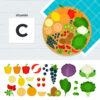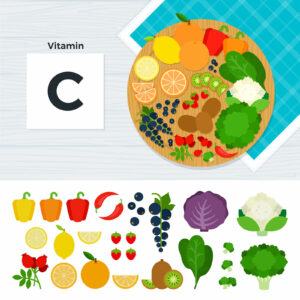
All About Vitamin C
If there’s one vitamin out of the 17 in our Ocu-Plus formula that you’ve already heard about, chances are, it’s vitamin C. This familiar face in the vitamin world is arguably the most important one for our body as a whole.
Though our blog mainly focuses on eye health, we really like to promote overall health. An unhealthy body will never have healthy eyes, and the opposite is also true. Every component in our body works in harmony with each other to keep us running in tip-top shape.
Seeing as vitamin A is so often dubbed “vitamin EYE”, it’s easy to assume that it would be the most important vitamin. We can certainly that it’s one of the most important for the eye. But for our overall well-being, vitamin C is definitely the one vitamin you don’t want to neglect.
What Is Vitamin C and What Can It Do?
Also called ascorbic acid, this vitamin is a water-soluble nutrient that can be found in various types of food. Vitamin C is a crucial vitamin for boosting your immune system and keeping your body running. It acts as an antioxidant as well. This means that when used topically, it can protect your skin from environmental damage as well. It’s truly a powerful vitamin.
Why is vitamin C so important for our body? It actually helps to produce a protein called collagen. This collagen is needed by our body to heal wounds. Without it, scrapes and cuts would never scab and they’d remain open wounds that could be easily infected.
Collagen is the most abundant substance in the body and can be found in the skin, bones and in connective tissues. Young bodies produce a lot of collagen, but as we age, our collagen production levels drop dramatically.
Vitamin C can help elderly people who aren’t producing as much collagen on their own anymore to up their levels. This can keep bones strong, help wounds heal faster and may even reduce sagging in your skin. Why do you think so many anti-wrinkle creams advertise their high levels of vitamin C and collagen?
The vitamin isn’t just great for producing collagen; it also helps the body properly absorb iron. If our bodies can’t properly absorb iron, we risk developing anemia, which can cause fatigue and other health problems.
Protecting Against Deficiencies
Most people get their daily intake of vitamin C from beverages and a varied diet. However, some people who don’t have access to a varied diet or who are exposed to a lot of second-hand smoke may be at risk of developing a vitamin C deficiency, which is also called scurvy.
No doubt you’ve heard about scurvy before. It’s the classic pirate disease. The reason scurvy is often associated with pirates is because pirates often didn’t have access to a wide variety of food while at sea. They would eat whatever they could get their hands on, and often it wasn’t anything healthy.
As a result, many pirates developed scurvy, which opened their weak immune systems to be attacked by various diseases. You may not be a pirate, but that doesn’t mean you can’t also develop scurvy. Some symptoms to look out for are bleeding gums (gingivitis), frequent nosebleeds, slow healing time and rough or dry skin.
The saying “an apple a day” has never been truer.

Vitamin C and Vision
I guess you could call this nutrient “vitamin SEE” because it has just as much influence on our vision health as vitamin A! We’ve already established that our bodies need vitamin C, especially as we age. It also helps our eyes to ward off two serious conditions normally associated with age: AMD and cataracts.
AMD, or age-related macular degeneration, is a disease that occurs when the macula begins to, well, degenerate. Over time, this condition will affect almost everyone. It’s a natural part of aging, but that doesn’t mean we can’t slow down the process to keep our vision healthy longer.
A study found that patients who took increased their vitamin C intake along with vitamin E, carotenoids, selenium, and zinc significantly reduced their risk of developing AMD.
If that didn’t amaze you enough, just wait until you hear about this next study. Women who had been taking vitamin C for 10 years or more saw a 64 percent decrease in the risk of developing cataracts.
By delaying cataracts for 10 years, these women can avoid half the surgeries that are often recommended to remove cataracts! The less surgery, the better, for both your peace of mind and your wallet!
Where Is it Found?
It’s most commonly found in foods and various drinks. You can get the majority of the vitamin C you need just from eating a well balanced diet. However, it can also be found in supplement form.
There are a couple of different kinds of supplements. Vitamin C comes in a typical pill form, a powder form to be stirred into drinks or in an all-inclusive supplement like our Ocu-Plus Formula.
Though our bodies need quite a bit of vitamin C because we don’t produce it naturally, it’s easy to get carried away and take too much vitamin C. Though the consequences of too much are not as dangerous as something like zinc, which could be toxic, it could lead to some mild discomfort.
Too much vitamin C can result in nausea, diarrhea and maybe stomach cramps.
Foods High in Vitamin C
Taking a vitamin C supplement is great, but you might want to couple that with a balanced diet of foods high in the vitamin. Here are some of our favorites:
- Oranges and orange juice
- Apples
- Kiwi
- Papaya
- Dark leafy greens
- Most citrus fruits
- Strawberries
There are a ton of foods out there that are high in this vitamin, which makes it super easy to work into our diets. Vitamin C helps to ward off disease, heal our bodies naturally, and keep our vision sharp and clear well into our old age.
Never underestimate the power of a glass of orange juice.
Our Rebuild Your Vision Ocu-Plus Formula Contains All 17 Vitamins, Minerals, and Herbal Supplements to Improve Your Eye Health!












Hi Ellen,
H.pylori infection appears to be associated with glaucoma (abnormal high fluid pressure in the eyes). Helicobacter pylori was detected in 88% of glaucoma cases and in 47% of healthy adults. Eye physicians are not likely to suspect or treat H.pylori when glaucoma was diagnosed.
hi I have dry eyes taking refresh now,but pressures are still high at 28 to 30 your ocu-plus and 1000 vit c powder and many other vitamins have not brought the pressures down.I have been on travatan drops 1x day,before that was on lapropost which my eye Dr,discontinued due to no rersponse.Any suggestions? thanks Meg
80mg vitamin C 20mg dihydroquercetine
I have Glaucoma. Can Vitamin C help lower the pressure in the eyes?